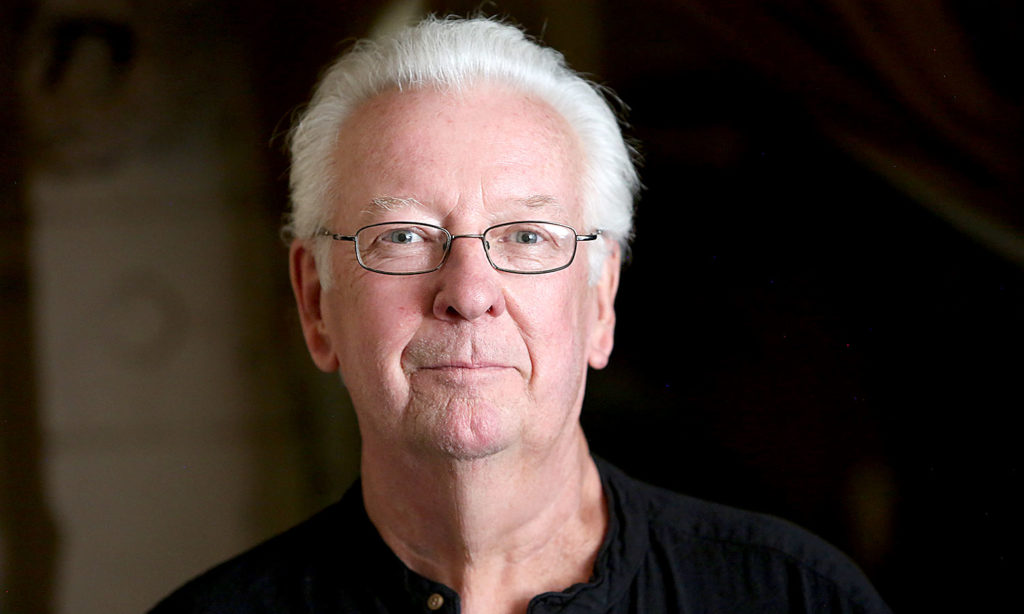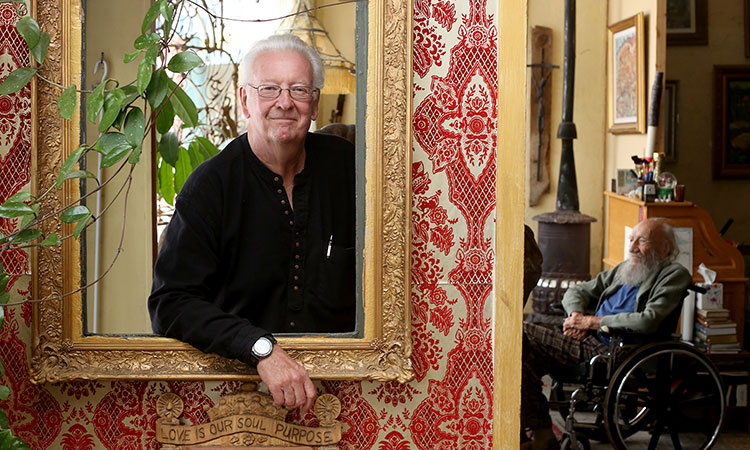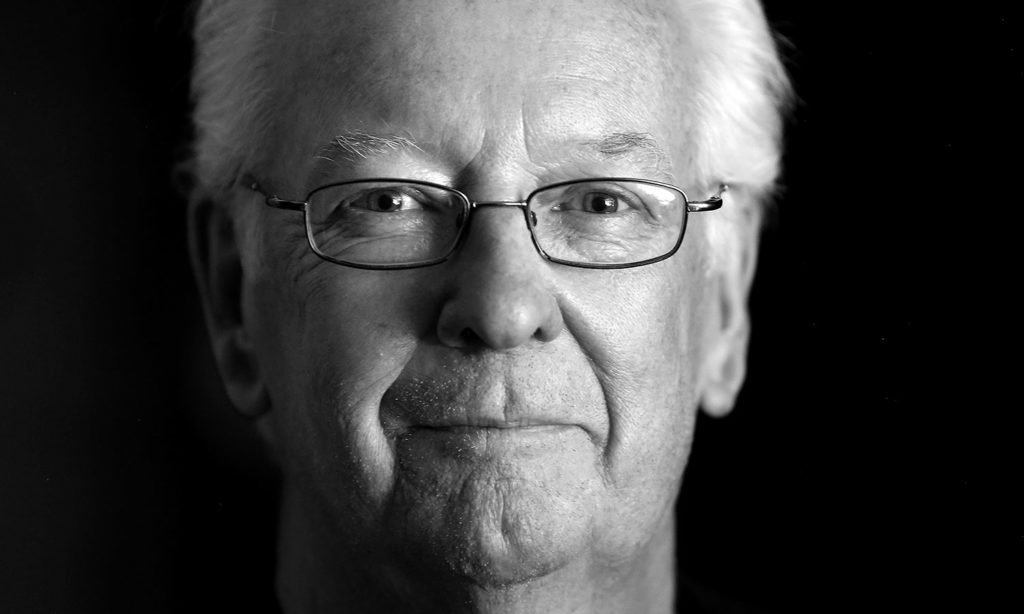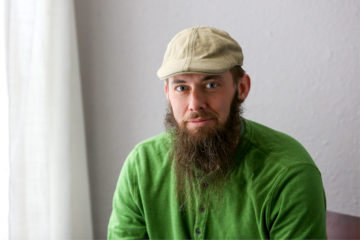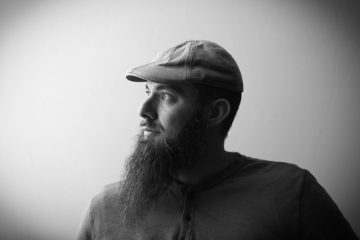Jeff Harms is an artist who deals in words and wit. He sails the world on a stage, regularly performing his family-friendly stylings of observational comedy for audiences from around the globe aboard cruise liners. Among other things.
Jeff, 64, is married to the actress Hannah Rockey, whom he has performed and taught improv comedy with for many years. The couple also collaborates in work for Millibo Art Theatre in Colorado Springs. Jeff writes plays that Hannah brings to life on stage.
When he sat down with Humanitou in the quiet storefront studio of his father-in-law, the artist C.H. “Rockey” Rockey, he shared insights on the craft of comedy and the best joke ever written. Rockey sat nearby, quietly listening.
We talked about money, art, war, and what Jeff has observed as a universal truth about humanity while living much of the past 22 years aboard ships.
Meet Jeff Harms.
Humanitou: How did you go from teaching theatre in high school to a career in comedy?
Jeff: While I was teaching high school, I was doing comedy at night. It started one night a week. Monday night, then a Tuesday. After a while, it was five nights a week, six nights a week. The comedy thing was starting to bust out. This was in the ’80s.
So I resigned from teaching to go full-time, because I had to do one or the other. I was still young at the time, and thought I would go full-time into comedy. I had been doing it since ’79. I went full-time in ’84 and haven’t looked back.
In addition to that, I’ve still taught. I’ve taught workshops, improv sessions. I wrote a couple of plays last year. I just finished my second Master’s (Luther Rice College & Seminary), in theology of all things, about a year ago.
Humanitou: I’m guessing it was a risky transition from the relative financial security of teaching to full-time comedy. Rockey has shared his thoughts on money and art with me before. I’m curious to know your thoughts on the subject.
Jeff: That’s a great question, because it really gets down into the heart of a lot of issues with art and commerce. There’s the old cliché that it’s show business, you know?
I found when I was younger we were all doing comedy and I was meeting people. I’ve worked with, I mean, you can name someone big in the comedy business and I’ve worked with them. Everyone from Seinfeld to Larry the Cable Guy and Roseanne.
And I had the drive always to master the craft. I always wanted to learn it. I studied it. I always felt that the money was secondary. I’ve had people say, “Why don’t you come to L.A.? And you should do this and that …” I’ve never had that desire.
It’s only human for me to be scared. I’m scared. But at the same time, I can’t go against the very thing I’ve committed myself to in a philosophical or spiritual way for all these many years. I can’t just abandon it.
When I was about 35 was when it really kicked in that I don’t care about fame. I want to be really good at my craft. I want to be paid a fair wage for my craft.
Hannah and I have been together for 23 years, and one of the things that I’ve learned from Hannah and (Rockey) is that money is a tool. That’s the way I look at it. Money is a tool to help you build something, that’s all it is.
I don’t care about accumulating stuff. When you get to a certain age, you just go, “All right, I can survive on this. I can do this and we’re good.”
Humanitou: I can watch comedy and laugh, and not always know why. Sensitive subject matter we couldn’t talk about with most people can be aired out on stage and get us to laugh instead of squirm.
I attribute that, in part, to the professional skills of comics. Can you shine light on what craft means in comedy, the nuanced work that resonates with audiences?
 Jeff: A lot of people say, “You know who should be a comedian is my cousin Bill. At Thanksgiving, he’s hysterical.”
Jeff: A lot of people say, “You know who should be a comedian is my cousin Bill. At Thanksgiving, he’s hysterical.”
That’s good. A lot of people are naturally funny. But that doesn’t mean that you can naturally be a comedian or a performer, because you have to have a focus and a purpose and an act.
There are rules of jokes. There are language things and ground rules. There are actual things in comedy that you grasp onto, and I can teach you all of that. What I can’t teach you is wit. That has to come from inside of you.
You can go to art school and learn all the strokes, but you have to have that extra thing to do that, you know? It’s the same with comedy.
Humanitou: Is there a specific example of how a joke gets crafted by a working comedian to make it successful?
Jeff: I wrote a book. It’s called, Show Me the Funny. It’s finding the humor in everyday life. One of the things that I do in the book is I analyze this very famous old, old joke by Henny Youngman. It’s a four-word joke: “Take my wife, please.” You’ve probably heard it.
I analyze it as maybe the best joke ever written. The simple reason for that is it deals with all of the rules of comedy. You have expectations for your audience.
You say, “Take my wife” and the idea is “Take my wife, for example.” But “Take my wife, please” is a surprise. It’s turning a corner that you don’t expect.
It’s concise. A lot of people when you hear them tell jokes, it’ll take them five minutes to tell a joke that could be told in 30 seconds. As a comedian, what you want to do is have the audience think to themselves, “Why didn’t I think of that? That’s true.”
Common ground, ideas that are universal. It’s one of the reasons I don’t ever do political comedy. Half the audience is going to agree and half is not. Why would I alienate half my audience? My job is to make an audience laugh.
I have personal views about abortion, gun control, civil rights, whatever, but that’s not my job. My job is to make people laugh. There are people who are really good at those things in comedy. That’s not my niche.
Humanitou: How do you describe your niche?
Jeff: Everyday life. I talk about my kids, my wife, my family, traveling. One of the biggest things I have in my act, a centerpiece, is about the junk drawer. I do 10 minutes on the junk drawer that we have in our kitchen. The universal things, where they come from and why they’re important to us.
So, my comedy would be in the style of Seinfeld, Leno, George Carlin. Observational humor with some storytelling. I don’t wear funny costumes. I’m not a clown. I’m not a joke teller, per se, although I know millions of jokes. I’m more observing everything around you.
Humanitou: Is there a common thread of personality you’ve noted in comedians over the years?
Jeff: Yeah. Most of it has to do with not wanting a job. (laughs) That sounds facetious, but most of us are like, “Don’t put me in a cubicle.”
That’s why I was a teacher, because I like the classroom. And I’m a performer because I like that, but don’t put me in a cubicle. That’s one common thread.
And I don’t buy into comics are sad on the inside. I’ve known many people who are just wonderfully, joyously happy. And other people were miserable. It’s just like everyday life.
I don’t buy the tears of a clown. I’m a relatively happy guy and I feel very blessed, and I can still do it. I’m not miserable.
Humanitou: You perform on cruise ships. What’s that experience like?
Jeff: I used to do up to 30, 32 weeks a year. This year I will have done maybe 15 or 20. That’s kind of all I want to do now.
It’s actually great. I’ve gotten to see the world. I’m a subcontractor on the ship. I’m not an employee, so I have freedom. When I’m not on stage, I do what I want to do.
The difference is, in a comedy club, you maybe start on a Tuesday night and do every night, and then do two shows Friday, two shows Saturday, and then Sunday. You do eight or nine shows a week, same show. You can work and work and work it.
On a cruise ship, you may get two nights the entire cruise. And you have to do two separate sets. You get one shot at the audience. You better be on your game. You can’t have a bad show on a ship. That’s the one downside. If you don’t do well, “See ya.”
There are stories of acts, comics, singers … “We’re just going to let you off at the next port. We’ll pay your airfare home. It’s just not working.”
I’m lucky it’s never happened in 22 years I’ve been doing this. I know what works on there. It’s a great job. The hardest part of it is being away from home, which is why I don’t want to do it as much as I have in the past. But it’s a great job.
I’ve gone everywhere from Israel to Russia, Hawaii, Europe. It’s fantastic.
One of the best and the worst things that ever happened in this country was winning World War II. One of the best things was it showed what this country can do. One of the worst things was it showed the money people how much money they can make on war.
Humanitou: You are, essentially, sequestered on the ship with your audience. That’s got to be tough to be recognizable to everyone and not get to disappear into anonymity.
Jeff: Hannah has been on a bunch of cruises with me. When she comes on a cruise, I’ll bring her on stage and we’ll do improv together.
She said to me an interesting thing the first time, “Boy, this is kind of an easy job, isn’t it? You’re just doing two nights, three nights and the rest of the time you’re free.”
And then she’d be with me after I’d done my show. You’re sitting there having lunch and people all day long come up to you and ask you, “How’d you get started? … I have a joke for you. You want to hear a joke?”
And she goes, “That’s when you’re on stage, is after your show.”
Humanitou: As a comedian, using that lens on life, is there anything in particular you have observed about humanity at-large? Especially as an observational comic …
Jeff: Yeah, there’s millions of things.
The majority of people who work on cruise ships are non-American. There’s about 50 different nationalities on ships. Everything from Australian to Indonesian, Filipino, Indian, Serbian. All these people.
It doesn’t matter what you believe or where you’re from. Pretty much everybody wants the same things. They want to be with friends and family, not get blown up by something they can’t control, and be able to leave it a little bit better than when they got here.
The one thing I know is that people tend to want the same things for their well-being, survival. We read about these people are ranting about this or that group. They’re ranting about their language or their race or their religion, or something like that. I’ve never seen that on the ship.
Twenty-two years, 30 weeks a year, 3,000 people, dozens of nationalities all on a floating thing, and I’ve never seen it. I’ve never seen a person of that color call someone of that color something, or someone of that religion call someone of that religion something.
Humanitou: You said you have personal views related to politics, though you don’t use that in your comedy. Any thoughts you’d care to share here that you wouldn’t on stage?
Jeff: I think it circles back, in my own opinion, to money.
When you have someone who is appealing to the baser instincts of people — and by that, I mean, “That guy over there, he’s the reason that you are not happy. They took your job. They’re threatening you” and all these kinds of things — there’s always in humanity, I believe, a strain of people who are threatened by something that they aren’t familiar with.
It’s easy to villainize those people. It’s easy to make them the other.
Humanitou: It gets used as a tactic of misdirection.
Jeff: It gets used as a tactic of misdirection to do what? Get votes. What do votes give you? Power. What does power get you? Money. What does money give you? More power.
It’s just this endless, endless cycle. That’s where we’ve been. If you want, I can go back. I’m a fanatic on history and conspiracy theories, and things like that.
One of the best and the worst things that ever happened in this country was winning World War II. One of the best things was it showed what this country can do. One of the worst things was it showed the money people how much money they can make on war.
And we’ve had, like, 12 years of peace in this country since then. Maybe less. Because war is money. That’s what it’s about. It just keeps rolling.
Humanitou: You recently overcame an experience with cancer. How did you face that? I imagine it stirred some contemplation on what life means, what death means …
Jeff: Well, being a person of faith and having studied theology and going to seminary, I said to Hannah:
“It’s only human for me to be scared. I’m scared. But at the same time, I can’t go against the very thing I’ve committed myself to in a philosophical or spiritual way for all these many years. I can’t just abandon it. I can’t just go, ‘God, what did you do to me?’”
You accept it. And it’s true, there are people far, far worse off than me. The worst of my pain, there’s millions of people suffering more than I ever dreamed of. So, yeah, it’s made me go, “I don’t want to do 30 weeks on the ships anymore.”
I want to be home. I want to see my kids more and be with my family more. I was working a lot to save so that I could slow down, and then this came along and made me slow down. I look at it as a gift.
It’s not a gift that I want recurring. It’s not cheese of the month club. (laughs) I learned what I needed to learn, let’s move on from there.
Credit: On-stage photo provided by the comedian, Jeff Harms.
 This Humanitou conversation is cross-posted at PeakRadar.com. PeakRadar.com is the Pikes Peak region’s cultural calendar and digital cultural center, connecting residents and tourists with our vibrant arts community. Your source for what’s happening is PeakRadar.com!
This Humanitou conversation is cross-posted at PeakRadar.com. PeakRadar.com is the Pikes Peak region’s cultural calendar and digital cultural center, connecting residents and tourists with our vibrant arts community. Your source for what’s happening is PeakRadar.com!
